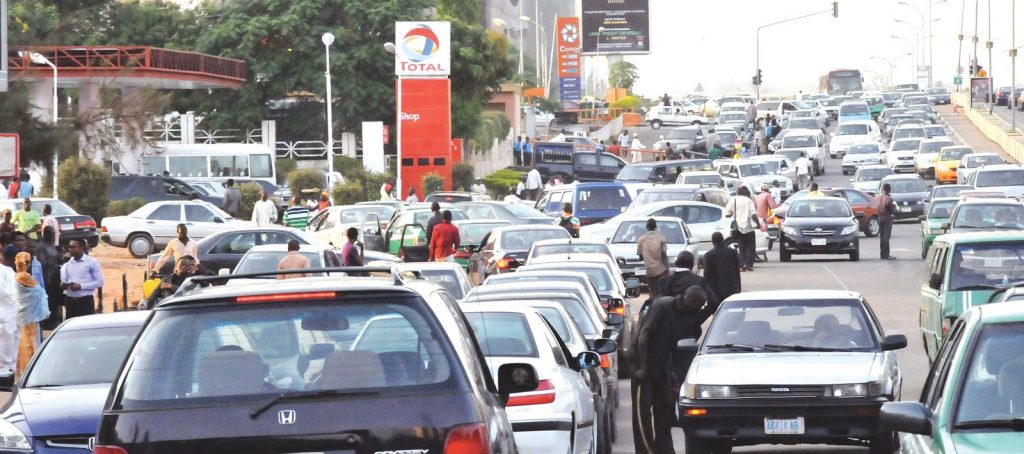
Oscarline Onwuemenyi
06 January 2018, Sweetcrude, Abuja – Another end of the year, and another avoidable fuel scarcity in Nigeria that impacts social and economic life in the country and makes life unbearable for millions of citizens.
Yet, even as the petrol crisis rages on, government officials and independent oil marketers could not help but launch into another round of the blame-game, each pointing the finger at the other for the acute shortages, both sides failing to recognize the urgent need to face up to market realities and, thus, the need to reform a dysfunctional system.
The politics of fuel price increase in Nigeria is a highly combustible one, and the present atmosphere is made more complicated by the looming 2019 presidential elections. Change in fuel prices indeed has far-reaching effects as its impact ranges from daily budget to macroeconomics like inflation numbers. But the present administration has chosen to bury its head in the sand as the reality of increasing fuel prices buoyed by a global increase in prices of crude washes over the industry.
Having inherited an N87 per litre fuel price at the beginning of his administration in 2015, President Muhammadu Buhari clearly remains adamant that the retail price goes no further than the present N145 per litre, against the obvious counsel of his minister of state for petroleum resources and the Nigerian National Petroleum Corporation (NNPC).
Private oil marketers in the country have argued that the pump price of Premium Motor Spirit, PMS, also known as petrol, must be increased. They said selling the product at N145 per litre is no longer feasible with the current exchange rate.
The marketers also said the shortage of foreign exchange and increase in crude prices, have made it unprofitable to import petrol and sell same at N145 per litre. The marketers also called on the government to intervene to enable them access foreign exchange at a special rate for the importation of petrol.
The Minister of State for Petroleum Resources, Dr. Emmanuel Ibe Kachikwu, seemed to agree with the oil marketers on some points. While sympathising with Nigerians for the difficulties experienced during the period of fuel shortages, Kachikwu blamed it on the inability of major oil marketers to import fuel due to price differentials between the rise in price of crude oil and the cost in Nigeria. “Before you have both sides complementing each other because 100 percent supply is demanding and people took advantage of the situation to perpetrate a lot of diversions. There is always a commercial reaction.”
How much have the prices risen?
Last Thursday, the minister disclosed to the Joint Committee of the National Assembly investigating the petrol scarcity that the national oil company, NNPC, has incurred a loss of N85.5 billion over three months (N800 – N900 million daily) in importing petrol and selling at a discounted price of N145 per litre, against the landing cost of N171 per litre.
Kachikwu explained that the N145 per litre price was fixed in the first quarter of 2016 when crude oil was selling for $49 and pointed out that with crude oil price rising to $67 a barrel, the pump price may no longer be sustainable.
The minister said the landing cost of Premium Motor Spirit (PMS) which was N133.28 per litre in 2016, is now N171 per litre, which has resulted in the stoppage of importation of the product by independent marketers.
According to him, this situation has forced the NNPC to be the 100 percent importer of the product, which is a problem for major oil marketers in the country.
The minister disclosed that as a result of the N26 difference per litre between the current landing cost of the product (N171) and pump price of N145, NNPC which had been singularly importing the product at the volume of 25 million litres per day since October last year, has been incurring a daily loss of about N800-N900 million, cumulatively reaching N85.5billion today, in just three months.
Kachikwu noted that, in the meantime, the government had mapped out strategies to ensure availability of petrol which will be sold at the government-regulated price. According to him, already the government has mandated him and along with a committee set up to find ways out of the problem which he said requires emergency of about 18 months before the local refineries are expected to be in good shape.
He said three solutions are being considered. “One is for the Central Bank of Nigeria (CBN) to allow the marketers access forex at the rate of N204 to a dollar as against the official rate of N305 to keep the pump price of fuel per litre at N145.
“Two, to give room for modulated deregulation where NNPC would be allowed to continue selling at N145 per litre in all its mega stations across the country while the independent marketers should be allowed to sell at whatever price is profitable to them in all their outlets.
“Three, to look at the direction of blanket subsidy for all the importers in bridging the gap which would be like going back to a problem that had earlier been solved,” he said.
He, however, stressed that the final solution to the problem was for the nation to put her refineries in good shape in a way that 80 percent of local consumption of the product should be provided for locally.
“The business module of fuel supply in the country is not yet where it should be but within the 18 months period expected to have the refineries work, we are working on how to accept benefits of crude oil price increase and ensure fuel sells at a regulated price,” Kachikwu said.
The global connection
Across the globe, many countries are responding to the increase in the price of crude. Only last week, Saudi Arabia, the world’s largest producer and exporter of crude, announced plans to raise petrol and jet fuel prices in January in an effort to reduce energy subsidies and bolster state finances.
Petrol prices are set to jump by about 80% while jet fuel prices will be raised to international levels, according to Bloomberg. Other fuel types and electricity tariffs are also expected to rise in price over the coming years.
Fuel prices, excluding jet fuel, are not expected to rise to international levels until 2023 at the earliest. Under Crown Prince Mohammed bin Salman’s plans to reform the economy, fuel subsidies are eventually to be totally eliminated.
The price hikes are part of the Kingdom’s efforts to reduce the amount it spends on state handouts and subsidies and to diversify its economy away from oil. In 2015, the International Monetary Fund predicted the Kingdom could run out of resources within five years if its rate of spending and the oil price slump continued.
Saudi Arabia first reduced subsidies in December 2015, when prices rose 40% to $0.24 per litre. As part of the Kingdom’s plan to bolster its finances, state oil giant Saudi Aramco is expected to float next year.
Such moves symbolise a change in the social contract between the Saudi absolute monarchy and its people, which has become increasingly untenable in the face of low oil prices.
According to the World Economic Forum, the Saudi state deficit stands at 12.4% of GDP, which Saudi authorities said last December they aimed to abolish by 2020. Next year’s budget is expected to be announced on December 19.
On the continent, Tanzania’s energy regulator has also announced an increase in the maximum price for petrol, diesel, and kerosene.
Tanzania’s Energy and Water Utilities Regulatory Authority (EWURA) said in Dar es Salaam that the increase was unavoidable due to rising international crude oil prices. The authority raised the maximum retail price of petrol by 0.35 percent and increased the cap for diesel by 1.71 percent.
What’s next?
The Federal government has resisted every attempt to increase the pump price of fuel to reflect the global market pressures. The motive of government as can be deduced from the picture above is clearly political and not altruistic.
President Buhari, who has come under intense criticism from several quarters over his administration’s handling of the fuel crises roiling major cities across the country, has instead alleged sabotage on the part of oil marketers.
“The key issue is a price war. The marketers have made representation to the Federal Government and the Minister of State for Petroleum Resources, Dr. Emmanuel Ibe Kachikwu, to allow price hike of petroleum products and leave the sector to market forces,” a senior government source said.
He added that “The President and Senior Government Officials are, however, opposed to price hike because of its spiral effect on the socio-economic life of the nation. It also has grave political implications for the survival of the present government.
“Before the crisis, the nation used to consume between 30 million to 35 million litres of Premium Motor Spirit (PMS) daily but since this current challenge started, the consumption has shot up to 80 million litres per day.
“Without a soothsayer, it is obvious that something had gone wrong. We cannot just rule out sabotage including diversion of products.”
President Buhari and the NNPC should take a realistic position on the fuel crises. There is no doubting the fact that price of crude has risen in the world market. And there is no doubt that more than half of the fuel we consume is imported from overseas. That being so, marketers are buying the refined oil at a higher price than the crude we refine in Nigeria. So, why force them to sell at lower than the cost price?
Other valid questions that must be addressed if the nation would ever solve the fuel scarcity conundrum: Is the Nigerian oil and gas industry deregulated, as has been claimed by the administration, or not? How much subsidy does the NNPC really pay itself as sole importer of petrol? Who benefits from the status quo in the petrol price war?
The Minister of State said during the Joint Committee hearing that he has offered to the President a modulation plan to increase the retail fuel price as the crude price rises in the international market, but is yet to receive approval from the President. This means that the retail price of fuel stays at N145 and the NNPC continues to incur heavy daily loses. But how long can this continue?
In the meantime, the Petroleum Industry Bill (PIB), which purports to completely deregulate the downstream sector lags in the National Assembly, lacking momentum to go on.



